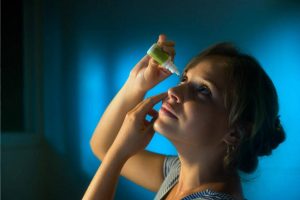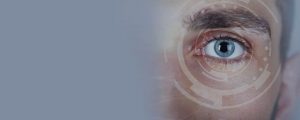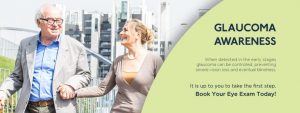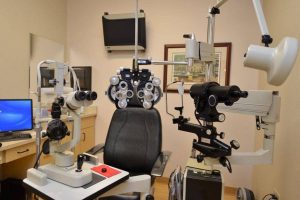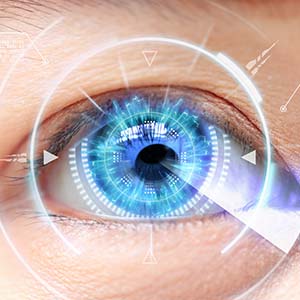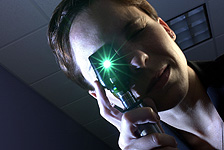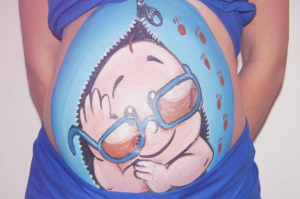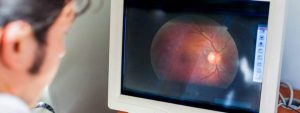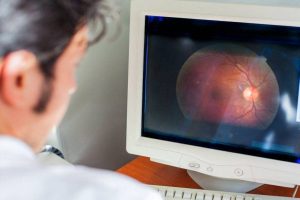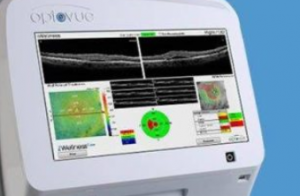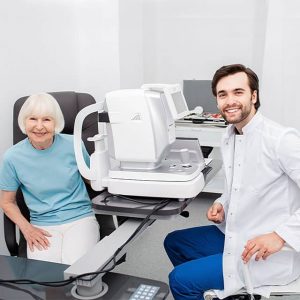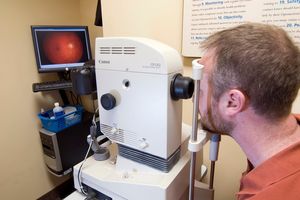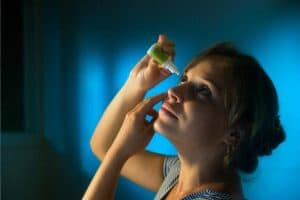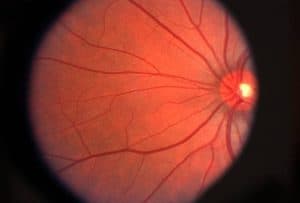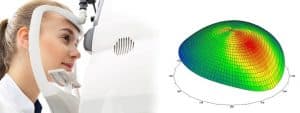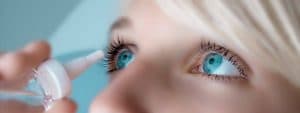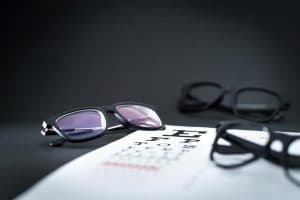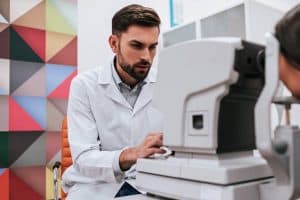Having Difficulty Seeing at Night?
Do you find it difficult seeing while driving at night or reading in a dimly lit room? You most likely have nyctalopia, also known as night blindness.
Read MoreCan Eye Drops Be Overused?
Overusing eye drops can cause more harm than good. Do you find yourself constantly reaching for eye drops? While eye drops may provide satisfying and
Read MoreWhen is Blurred Vision a Medical Emergency?
A problem with any part of the eye, such as the retina, optic nerve or cornea, can suddenly cause blurred vision. Slowly progressive blurred vision is usually caused by long-term medical conditions. Sudden blurring is most often caused by a single event. Some instances of sudden blurred vision are medical emergencies that must be treated as soon as possible to prevent permanent damage and vision loss.
Read MoreGlaucoma, Tunnel Vision and Low Vision
Glaucoma causes ‘Tunnel Vision’ and is one of the leading causes of blindness worldwide. Glaucoma is an eye diseases that damages the optic nerve, leading to permanent vision loss. The most common type of glaucoma shows no early warning signs, and can only be detected during a comprehensive eye exam. If left untreated, glaucoma can cause peripheral vision loss and even permanent blindness.
Read MoreGlaucoma: What are the Signs?
Did you know about 3 million people in the U.S. are affected by glaucoma, but only half are aware they have it? Over 90% of
Read MoreGlaucoma: ‘The Silent Thief of Sight’
Did you know that rock star Bono from U2 has glaucoma? U2’s Bono is not alone, at least 3 million North Americans have glaucoma, but only 50% know they have it! In 95% of glaucoma cases, it starts off asymptomatic and by the time the condition is noticed, the vision loss is irreversible. That’s why regular eye exams are so crucial, even if you don’t suspect a problem.
Read MoreSmoking and Glaucoma
We all know smoking impacts our general health, but did you know it can also affect the eyes? More than 1 billion people worldwide smoke
Read MoreWhat to Do Before an Eye Exam?
About to come in for your eye exam? To get the most out of your visit, start preparing with these 4 tips. If you’re experiencing
Read MoreCan Sugar Affect Eye Health?
We all enjoy a sweet treat now and then, but too much sugar in our diet can come at a price. Here’s how eating excessive
Read MoreCan Sleep Apnea Affect Your Eyes?
Sleep apnea can affect not only your physical health, but can have serious consequences for your eyes and vision too. If you have sleep apnea,
Read MoreGlaucoma: Myths and Facts
Do you want the facts on the most common glaucoma myths? More than three million Americans are living with glaucoma, 2.7 million are aged 40 and older.
Read MoreGlaucoma: Can Meditation Help?
Could meditation be the next glaucoma ‘wonder drug’? Can adding meditation to your day help manage your glaucoma? What is Glaucoma? Glaucoma is a common
Read MoreICL Surgery: What to Expect
Over 1 million ICLs have been implanted globally. An implantable collamer lens (ICL) is an artificial lens that’s permanently implanted in the eye, this surgical
Read MoreEyes and Obesity
Obesity is a global medical epidemic, research clearly shows the direct correlation between obesity and eye diseases. Studies show that obesity increases the risk of
Read MoreScience Needs Compassion
Have you ever wondered if the smile of a nurse or the bedside manner of a doctor actually increase the chances of positive treatment results?
Read MoreDoes Smoking Affect the Eyes?
Smoking, especially over a long period of time, can have a major effect on your eye health and vision. The effects of cigarettes and tobacco on health are widely known, but few understand the negative impact they can have on eye health and vision.
Read More9 Ways Eyes Change With Age
As you age, you may discover that your vision just isn’t as sharp as it used to be. Vision changes can occur over time and cause you to wonder if what you are experiencing is normal or if you should schedule an appointment with your eye doctor.
Read MoreDiabetes: Why You Shouldn’t Skip Your Eye Exams
Annual eye exams can prevent 95 percent of vision loss. Diabetes affects around 10 percent of the American population, yet nearly 60 percent of people
Read MoreWhy Am I Seeing Halos?
Seeing halos around lights can be a cause for concern, or it can be completely normal. If you notice a sudden appearance of halos or
Read MoreWhat’s Worse: High Myopia or Smoking?
Smoking can lead to the development of sight-threatening eye diseases — but did you know that myopia can also increase your risk of these serious
Read MoreShould I Be Worried About Myopia?
Myopia (nearsightedness) progression in children doesn’t only result in needing stronger glasses, but also leads to serious sight-threatening eye conditions. Below are the most common
Read MoreCan Your Child Benefit from Myopia Management?
According to studies, myopia management has shown to reduce myopia progression by up to 78%. Myopia management is a treatment program that involves multifocal glasses or contact lenses, overnight ortho-k lenses, MiSight lenses, or specialized eye drops— all scientifically proven to reduce the rate of myopia progression and the risk of future eye diseases associated with myopia.
Read MoreLight Sensitivity (Photophobia)
Light sensitivity is one of the most common visual complaints. Light sensitivity, clinically termed photophobia, can cause discomfort in the presence of natural and artificial
Read MoreCan Steroids Affect Vision?
While steroids are a commonly prescribed treatment, they must be taken with caution as they can also produce certain side effects that can affect your eyes and vision. Corticosteroid drugs, also called steroids, stimulate the production of cortisol in the body. Cortisol is a natural hormone that helps to stabilize the body’s anti-inflammatory response system, and maintain immune function and blood pressure. Doctors typically prescribe steroid drugs to reduce any type of inflammation in the body, including eye inflammation.
Read MoreCataract Surgery Complications
Every year, over 9.5 million cataract surgeries are performed, worldwide. While the overwhelming majority (98%) of cataract surgeries are successful, like any surgical procedure there
Read MorePregnancy Complications: When to See an Eye Doctor
How do pregnancy complications affect the eyes? Pregnancy is a time filled with lots of excitement and emotions— but pregnancy can also have an impact
Read MoreWhat Is an Eye Stroke?
A retinal blood vessel occlusion, commonly referred to as an ‘eye stroke’ occurs when the blood vessels in the eye become narrowed or blocked. The
Read MoreNight Blindness: Treatments and Prevention
Night blindness (nyctalopia) affects vision clarity in low light conditions and can significantly impact performance of daily activities. Night blindness, despite its name, does not
Read MoreWhat Causes Night Blindness?
Night blindness (nyctalopia) causes reduced vision in low light conditions, and can be a source of fear and anxiety for those affected by it. Decreased
Read More4 Ways Diabetes Can Affect Your Vision
Diabetes can increase your risk of eye disease and permanent vision loss. Diabetes affects the way your body regulates glucose (sugar), and prevents the glucose
Read MoreWhat Is an OCT Eye Exam?
An optical coherence tomography scan (OCT scan) is a critical device for the early diagnosis of many serious eye conditions. An OCT eye exam is
Read MoreWhat Is a Digital Retinal Image?
Digital retinal imaging (DRI) is a quick and painless way for your eye doctor to look inside your eye and track changes to your ocular
Read MoreVisual Field Testing
What is a visual field test? Your visual field is simply all the areas you can see at one time. This area includes all the
Read MoreWhy Is Eye Pressure Important?
Have you heard your eye doctor mention ‘eye pressure’, but you are not really sure what it means? Eye pressure, also called intraocular pressure (IOP), refers to the fluid pressure inside the eye. Maintaining a healthy IOP will help to preserve your vision and prevent vision loss from eye conditions such as glaucoma, a sight-threatening ocular disease.
Read MoreNormal Tension Glaucoma
What is normal tension glaucoma (NTG)? Glaucoma is the name for a group of ocular diseases that occur as a result of: High eye pressure
Read MoreGlaucoma FAQs
The top 12 glaucoma questions asked by patients to their eye doctors.
Read MoreWhat Is Open Angle Glaucoma?
Open-angle glaucoma accounts for more than 80% of all glaucoma cases. Open angle glaucoma (OAG) is the most common form of glaucoma that usually progresses
Read MoreWhat Is Angle Closure Glaucoma?
Angle closure glaucoma is a rare, but serious form of glaucoma that requires immediate medical attention. Closed angle glaucoma develops as a result of a
Read MoreCan I Prevent Glaucoma?
Catch the ‘Silent Thief of Sight’ before it catches you! The most reliable way to prevent vision loss from glaucoma is by visiting your eye doctor for regular eye exams. While preventing glaucoma altogether is not yet possible, early detection of the disease can help to preserve your vision, and reduce vision loss. Your eye doctor can identify signs of glaucoma, even in its early stages, and then recommend effective treatments to stop or even reduce its progression.
Read MoreHow Is Glaucoma Treated?
Unfortunately, a cure for glaucoma and the ability to reverse it’s damage to the eye has yet to be discovered. However, there are treatments available to help stop, or at least reduce, the progression of the disease by lowering or controlling IOP.
Read MoreRetinal Diseases
What is the primary function of the retina? The retina is a thin layer of tissue that contains millions of light-sensitive cells (rods and cones),
Read MoreOcular Oncology
What is ocular oncology? Ocular oncology involves the diagnosis and treatment of all tumors that occur in or around the eye— tumors of the eyelid,
Read MoreCorneal Diseases
What is the cornea? The cornea is the clear, protective outer layer of the eye. It acts as a barrier and filter— protecting our eyes
Read MoreGuide to Eye Drops
What are eye drops used for? Eye drops are commonly administered or prescribed by eye doctors for a number of different reasons. The most common
Read MoreWhat is Low Vision?
Do you or a loved one have low vision? Low vision is diagnosed when vision cannot be fully corrected with glasses, contact lenses, or eye surgery— allowing you to participate in every day activities. It is often accompanied by blurred vision, blind spots or tunnel vision— and may also be called legal blindness. Low vision may prevent you from driving, watching TV, reading, using a computer or participating in your favorite hobbies.
Read MoreWhy Is Myopia Management Important?
Is there a way to prevent my child’s myopia from worsening? A number of recent studies suggest that it may be possible to control myopia by totally stopping, or at least slowing down, its progression during childhood and teenage years. Myopia management is a treatment program aimed at controlling myopia, keeping the level of myopia as low as possible, in order to reduce your child’s risk of developing vision threatening eye diseases later in life.
Read MoreThe 4 Frequent Eye Conditions
Have you been told you have an eye disease or need eye surgery? This guide will help you understand the 4 most common eye conditions:
Read More

